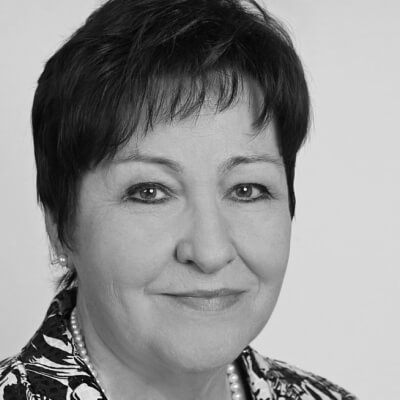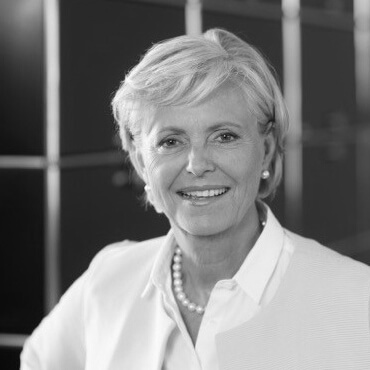Still only few women choose the financial sector. Why this is also a disadvantage for companies and how they can attract more women.
Women are still rare in the financial world! Maybe not when you call your bank's call centre to make an appointment. And not even when you report a claim to your insurance company. In the "service" positions, which are unfortunately often not as prestigious and less well paid, you will disproportionately often meet women.
But further up the career ladder, in the exciting and demanding positions where the business wheel is turned and good money is earned, we still see very few women in finance in 2023.
Status quo: How many women work in the financial sector ?
Der Finanzsektor bietet jede Menge interessante Jobs, aber viele junge Frauen wissen nichts davon. Einer der Gründe: Sie kennen niemandem aus ihrem direkten Umfeld, der in der Finanzbranche arbeitet. Sie wissen, was eine Lehrerin macht, eine Busfahrerin oder eine Zahnärztin. Aber wie der berufliche Alltag einer Vermögensberaterin, einer Versicherungsmaklerin oder einer Bankerin aussieht, ist nicht so klar. Wer nicht im Freundes- oder Familienkreis Menschen kennt, die solche Jobs haben und gern davon erzählen, dem entgehen solche Berufsbilder schlichtweg.
It is also clear that if only a few career-minded women enter the financial sector from the outset, only a few will reach the executive floors. This is probably the most important reason why the financial sector in Germany is still dominated by men - at least in the upper echelons. In other words, where it is exciting.
Want some facts?
Women in the banking sector:
According to Statista, the share of women in the executive floors of banks in Germany is a meagre 9.8 %. So women are still clearly underrepresented in the banking world! In 2009, the share of women was even lower, at a measly 2.6%.
Women in the insurance sector:
It is hardly better here. There, the quota of women in management is 11 %. Here, too, one can speak of an increase - despite the low figure - because in 2009 the proportion was only 2.8 %.
Women in Asset Management:
And how does it look in asset management, i.e. at the fund companies? Fund Women 2022 found out that there are only 13.7% women on the management boards (1st management level). So not much better!
Women in the financial sector - disadvantaged by companies?
For the few female students of economics who choose the financial sector, the way ahead is not exactly barrier-free. Many asset managers, banks and insurance companies have recognised the problem of the low percentage of women. They would like to see more women in leadership positions in the financial sector and also announce that they want to make an effort. At the end of the day, however, the positions are apparently filled predominantly by men.
This suggests that companies are struggling to select women for top leadership positions. Our conclusion: either companies are not looking properly or they need to do more to build their diversity pipeline better.
Because there are no factual reasons why women cannot make it to the top in the financial sector. You don't have to lift heavy objects, which men can do better than women on average. You don't need to be fast, which men - at least on average - can do better. In addition, you don't get dirty, which women tend to like less than men, and you don't work outside in the wind and weather, but in a rather well-kept ambience. No, from the outside, there is nothing to be said against a job for women in the financial sector!
It is by no means the case that women are not interested in the subject of finance or that they do not enjoy it in principle. On the contrary: women can manage well! Handling scarce resources - such as money - carefully is in women's blood. Mitigating individual risks within the framework of a large collective of insured persons is what women like! So what is the problem?
Obviously, there are two issues here: On the one hand, fewer women than men enter the financial sector from the outset. On the other hand, women do not seem to be promoted there as quickly as their male colleagues. So women have the impression that the industry is dominated by men ...It´s a vicious circle.
The biggest network for women in finance in the DACH region

Why should more women work in finance?
Before we look at how to get more women into the financial sector, we need to clarify whether the current shortage is a problem at all. In a nutshell, why would it be good to have more women in the top levels of the financial towers?
The answer is: it would be good for both sides! On the one hand for the women themselves, because the industry lures with very interesting and top paid jobs, that women can do well - physically and mentally anyway. On the other hand, it would also be good for the financial sector if there were more women in the management boards.
Why are women so urgently needed in the financial sector? Simply because women make up 50 percent of the population and virtually everyone has to deal with the topics of finance, banking and insurance. Many women prefer to get advice from their peers. Many women would prefer to see their finances, their funds or their insurance managed by women as well. For example, I personally have the feeling that women - at least on average - are more empathetic and careful. In personal financial counselling, empathy is a big plus. And diligence is essential when managing money.
Is it presumptuous of me to suggest that women are less likely to freak out if only the bonus is big enough? It may sound exaggerated, but there is something to it: if it had been the Lehman Sisters instead of Lehman Brothers, the 2008 financial crisis would have been different, probably milder. Or it would not have happened at all. Women are less likely than men to believe they are the only ones with a mega trading idea. They don't put all their eggs in one basket because they believe they will see something that no one else will notice.
Women in financial consulting
Möchtest du wissen, wie der eine oder andere Job im Alltag aussieht? Wie erfolgreiche Frauen ihre Familien- und Lebensplanung in Einklang bringen? Lerne einige dieser Frauen kennen!

"Mir gefällt an meinem Job, dass er sehr abwechslungsreich ist"
Annika Peters
FrauenFinanzBeratung

"Even today, it's still a good time to start your own business as a consultant!"
Dr. Eva Lemke
Apella

"The bureaucracy and the consulting effort have become much more extensive"
Barbara Rojahn
FrauenFinanzBeratung
Dear people, we have seen in the last decades that too much testosterone harms the financial industry. It makes it vulnerable and increases risks! This is why the industry benefits from diversity. More diverse teams make the financial sector more colourful, more mixed, more cordial, less cut-throat and stretched to the limit. And that is exactly why they lead to better results in the end. A one-sided focus on "higher, further, faster, hyper-optimised" can lead to extreme upward and downward outliers. The downward outliers can end in disaster, as we saw with Lehman Brothers.
Need some examples?
- Who hyper-optimised the ratings on partly ailing US real estate loans and helped the corresponding ABS securities - at least part of them - to get a AAA rating? Men in optimisation mania!
- Who invented Cum-Ex and thus the organised fraud against taxpayers? It was male advisors and bankers!
- Who at Wirecard just represented two billion euros that didn't even exist? It was megalomaniac men from the top management of the company!
- Who invented Ponzi schemes, in which those who start out earn good money, and those who follow later usually go away empty-handed? It was the American swindler Charles Ponzi.
- Which highly respected securities trader managed to pull off a fraud totalling around 51 billion euros? It was Bernard Madoff, who was previously chairman of the US technology exchange NASDAQ!
- Who was the founder and CEO of FTX, the crypto exchange that went bust in 2022? It was Sam Bankman-Fried, a 30-year-old former Wall Street trader!
Probably too much testosterone was involved in all these events, which apparently helps to push the optimisation of systems to the extreme and thus lead to the absurd.
Are there also women who do this? One could argue: If there are fewer women in leadership positions, there are also fewer women making the wrong decisions. That may be, but women - at least on average - are not so keen on pushing things to the very limit, hyper-optimising and pushing their bonus to dizzying heights. Sure, they want a bonus for good performance, but not the super bonus!
With a lot of thought, the most that comes to mind is Silicon Valley icon Elizabeth Holmes. The biotech entrepreneur offered a rapid blood tester with her company Theranos that could supposedly detect 240 diseases. However, the testing device was largely ineffective, something Holmes was aware of. Nevertheless, she raised many 100 million US dollars until the fraud was uncovered. Holmes was sentenced to 11 years and 3 months in prison in 2022.
I can't think of more women who have been involved in financial fraud scandals, although there are one or two women in senior positions. But the many cases where men have masterminded or perpetrated solid fraud suggest that more diverse teams would simply be a good corrective!
How do we get more women in the financial sector?
On the one hand, more women need to enter the industry. On the other hand, they would also have to stay in the industry in the long term and be willing to move up.
First of all, to get started in the industry: a survey of more than 1,100 students at the University of Mannheim and Fondsfrauen revealed that the perception of the finance industry is extremely negative. Incidentally, among female as well as male students. Women felt particularly repelled by the following three points about the financial industry:
- Not very family-friendly and male-dominated
- No compatibility of the job with one's own moral concepts
- zu hohe Wettbewerbsintensität
Fortunately, there has already been some movement here, but the "Wolf of Wallstreet" apparently still roams around in many minds. Therefore, companies are challenged to talk more about the fact that they have become more family-friendly, place value on moral action and have alleviated competitive pressure. "Do good and talk about it!" is what one can only call out to the companies, because many things have indeed developed for the better.
The next thing is to retain and develop women working in the financial sector. To do this, they have to be trusted, they have to be promoted, just as men are promoted to various career levels and sent to fast lane programmes.
We will not be able to change the fact that women have children in the foreseeable future. But it must also be possible for mothers to have interesting careers in the financial sector. Corona was certainly a real booster here and brought a lot of flexibility to the jobs. But mothers also have to be given some confidence, and they have to be motivated and encouraged. And when that happens, it should also be communicated!
These are the points we would like to put in the booklet of the companies. But of course women also have to contribute something to change the situation. We women have to show ourselves, speak at events and panel discussions and actively network so that we are noticed. It doesn't help to just be good, the environment has to see it too!
We also need to have more confidence in ourselves. It's not because of a lack of knowledge: many studies show that girls have better grades at school and that the quotas are largely balanced at university. But we also have to shout "here!" sometimes and just do it in order to succeed. This requires self-confidence and courage. If we women support each other in this, it can only be helpful.
It is also useful to have role models in the companies who signal: Women are wanted here and they can also rise to the management levels - the way is clear!
About Fondsfrauen
As the largest career network in the financial sector, we as Fondsfrauen are working diligently to get more women into good positions in the financial sector. We bundle interesting jobs on our website, host regular Events (online and offline) and offer Mentoring for experienced and newbies More than 3,000 women have already joined!
Would you like to join us? Subscribe to our newsletter, to be regularly kept up to date!
You want to become a member of the Fondsfrauen right away? Here you will find all information about the membership.





